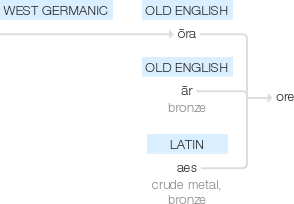Ore
Old English ōra ‘unwrought metal’, of West Germanic origin; influenced in form by Old English ār ‘bronze’ (related to Latin aes ‘crude metal, bronze’).
wiktionary
From Middle English or, oor, blend of Old English ōra(“ore, unwrought metal”) and ār(“brass, copper, bronze”), the first a derivate of ear(“earth”), the second from Proto-Germanic *aiz (cognates Old Norse eir(“brass, copper”), German ehern(“of metal, of iron”), Gothic 𐌰𐌹𐌶( aiz, “ore”)), from Proto-Indo-European *áyos, h₂éyos. Compare Dutch oer(“ferrous hardpan; bog iron ore”). Compare Latin aes(“bronze, copper”), Avestan 𐬀𐬌𐬌𐬀𐬵 (aiiah), Sanskrit अयस्(áyas, “copper, iron”).
etymonline
ore (n.)
"a metalliferous mineral or rock," especially one worth mining, 12c., a merger of Old English ora "ore, unworked metal" (related to eorþe "earth;" see earth (n.); and cognate with Low German ur "iron-containing ore," Dutch oer, Old Norse aurr "gravel"); and Old English ar "brass, copper, bronze," from Proto-Germanic *ajiz- (source also of Old Norse eir "brass, copper," German ehern "brazen," Gothic aiz "bronze"), from PIE root *aus- (2) "gold" (see aureate). The two words were not fully assimilated till 17c.; what emerged has the regular modern form of ar but the meaning of ora.
